"It doesn’t take a Rhodes Scholar to work out that we are very bad at predicting future events in general, and sadly we all too often play this game bouncing from past events to future events as skilfully as Tiger Woods is at holing clutch putts". 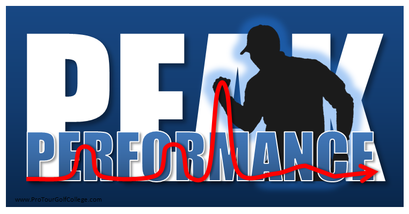 Playing golf can be likened to riding a wave of pure emotion for many golfers, where from moment to moment you can go from the highest high to the lowest low as a result of the way you play. You hit the perfect shot that soars effortlessly up into the sky and starts tracking like a laser guided missile straight for the pin. You are completely immersed in the shot as you watch it travel closer and closer to your target only to witness it bury deep into the side of the bunker that was protecting the pin placement. A simple mistake in club choice has left your perfect shot five yards short of perfect in the most dire situation. How quickly it can change. I know as you read this that you can truly relate to it because this scenario plays out over and over from novice through to professional golfer every day. Isn't it interesting that for many of us we so easily remember these less-than-perfect golf shots that we hit? There’s no doubt about it; there’s pain and anguish playing the game of golf and let’s face it, we wouldn’t want to have it any other way would we? 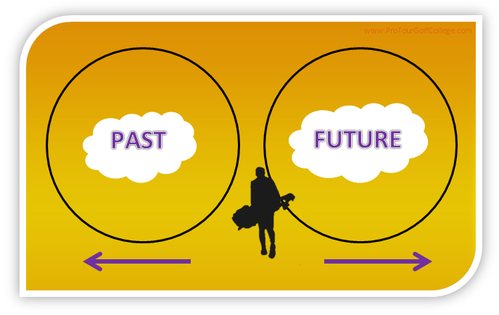 Well, I hear you say that you would prefer a little less torment and a lot more enjoyment when you play, and I can understand how you would want that. In today’s article I’m going to discuss a simple principle that will help you to deal with the ups and downs of golf like an expert. As a result of learning this simple principle and applying it consistently to your game you will greatly improve your golf scores. We hear so often in golf telecasts about the importance of developing the right attitude for playing golf and yet one of the problems with playing golf is that you grow up with one considerable daily challenge that could possibly be the source of many of the problems serious golfers face. Virtually all the information you are exposed to every day of your life is focused on past events or future events.The news and current affairs programs milk recent events for all that they're worth, until another story comes along, and then off they go again. If you are like me you've grown up in front of a TV or a radio listening to news channels continually discuss significant event days after they happen. Today with the phenomenal speed of the internet a new generation of golfers is facing the same problem only it has accelerated one hundred fold. This perpetual cycle of past - to - future - thinking becomes a normal way of thinking for many; including golfers.  The golf commentators also talk about possible future scenarios as if they had a crystal ball they were gazing into, making predictions about how such and such a golfer is likely to play the last few holes in the tournament. It doesn’t take a Rhodes Scholar to work out that we are very bad at predicting future events in general, and quite brilliant at lamenting over past events. Sadly we all too often play this game bouncing from past events to future events as skilfully as Tiger Woods is at holing clutch putts. But here's the thing; we do not know what is going to happen from one moment to the next. This is a basic fact about human existence that is as consistent as the sun rising and setting every day. However, what we do naturally and really well is imagine outcomes that we would like to have (or not have), and then we go after them as if real. 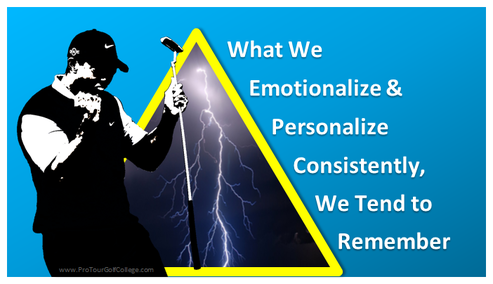 They are not real, but here’s the point; if we emotionalize and personalize them enough, they become real for us. In other words if we practice the emotional behavior, we get it! Good or bad, right or wrong, or positive or negative. This important principle basically says that what we emotionalize and personalize consistently we tend to remember. The unconscious mind makes no distinction between a good or bad result, it just responds to the stimulus, if provoked enough. If you get overly emotional over a good or positive result, it stamps or marks (remembers) the moment; and if you get overly emotional over a bad or negative result, it stamps or marks the moment. 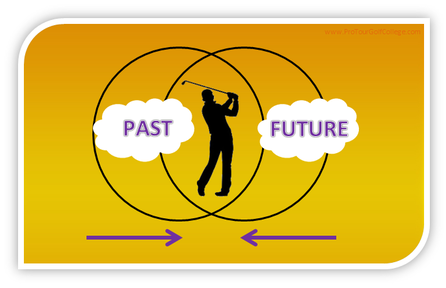 So you should understand that the idea is to emotionalize results you want, NOT results that you don't want. Now I hear you saying that you already know this, and you might, however this is something that you want to develop into a consistent behavior, not just have an understanding of and/or support the theory. Have you noticed how often Tiger Woods fist pumps when he holes a putt? It doesn't matter whether it's a short putt or long putt, he stamps or marks the moment. This 'clench and pump' fist pumping technique is used for marking or remembering the moment, and is sometimes referred to as anchoring. The idea is to clench your fist just as you reach the peak moment of the experience (say as the ball is tracking the hole), and cock your elbow (hold it as its going into the hole) and then pump your fist as it hits the bottom. Marking this powerful moment in time and doing it over and over will help you to get into the ideal performance state faster. Watch carefully next time Tiger or Phil (in particular) hole a putt and you will see the sequence played out over and over. The Simple 3 Step Peak Performance Technique
Step 1. Clench The Fist Step 2. Cock The Elbow Step 3. Release The Punch In the image above the more you anchor, the more in the moment you are, (not in the past or in the future) and the key is to anchor results you are happy with, NOT the one's you're not happy with. The beauty of anchoring is that it is something we already do many times a day, in-fact anytime you engage well learned habits that put you into either negative or positive states, you are anchoring or reinforcing the behavior - mentally and physically. When you listen to your favorite music for example, and it puts you into a good mood, you are using a music anchor to change your mood to positive, and when you get frustrated or even angry because someone has cut you off in traffic you are also using an anchor to change your mood. An anchor is simply a strategy for getting you into a productive or unproductive state, and you need to be very careful how you're responding to events on the golf course, because you could be anchoring a less-than-useful state, which could be holding you back from making progress with your game. When you play each golf shot you have a simple choice to make; will I anchor the result of the shot to remember it, or will I ignore it because I don't want to remember it? A simple choice to make but which one will you take? Lawrie Montague and David Milne - Pro Tour Golf College Your Success On Tour is Our Business 27/7/2013 07:36:16 am
Lawrie,David, 28/7/2013 06:44:36 am
Glad you enjoyed it John, and thanks for sharing your comments. Comments are closed.
|
Archives
June 2019
|
Proudly Supported By
Copyright © 2011 - 2018 Pro Tour Golf College
Website Managed By Golf Performance Media
All Rights Reserved
Website Managed By Golf Performance Media
All Rights Reserved

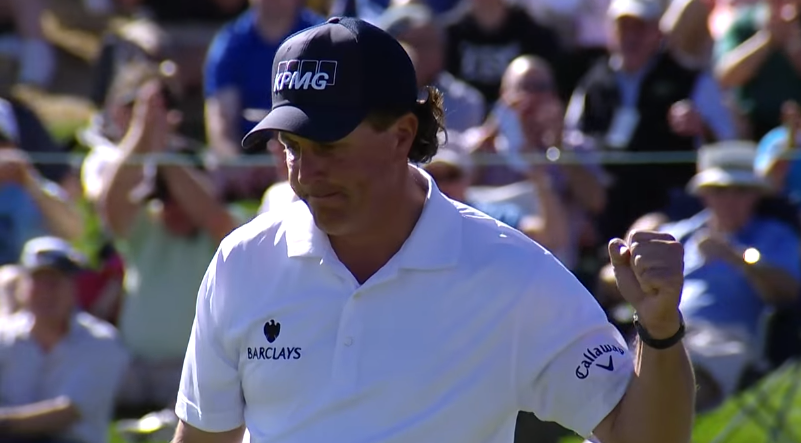
 RSS Feed
RSS Feed



